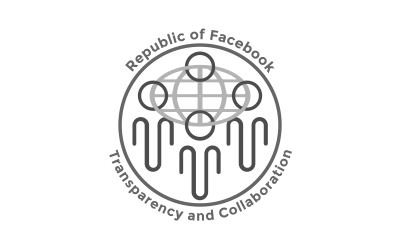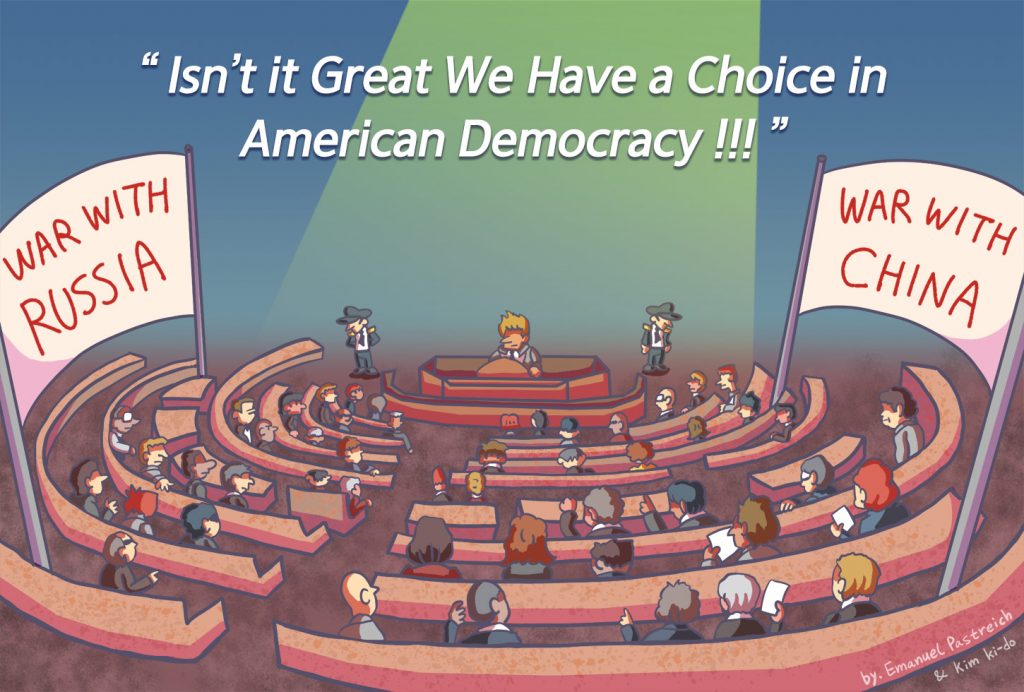Who Owns Facebook?

All Global Research articles can be read in 51 languages by activating the “Translate Website” drop down menu on the top banner of our home page (Desktop version).
***
There has been much chatter in the media about the unbridled power of social media tech giants and how they unfairly decide to censor certain voices, or, on the other hand, they fail to delete or block those spreading information that is judged to be false or misleading.
Such debates in the media is deeply misleading and destructive because
1) they focus on how to compel these massive consolidated companies to do what is in the public interest rather than asking how these handful of billionaires got the money to monopolize the means that we get information and communicate with each other and how that basic right can be returned to the citizen;
2) they refuse to consider that the very nature of these social media corporations are unconstitutional and that they are compelled by their profit model, and the interests of their wealthy stock holders, to use their platform to dumb down the population and to render all efforts to employ social media for debate and organization ineffective, and in many cases to introduce false, or unreliable information into the debate.
Sadly, most activists, whether concerned about the environment or social justice, turn to Facebook, Twitter or Google as a means of communication without ever considering that these for-profit multinational corporations have an inherent conflict of interest and that the first step if one wants to organize for social change it to create independent social communications systems.
Although marketed as open platforms for the citizens of the world, there is no democratic manner to appeal how Google searches are conducted, or Facebook is administered, let alone for citizens to make proposals and then vote on how they are implemented.
The ignorance of citizens about the nature of social media is far, far more dangerous today as increasingly multinational corporations and investment banks are using smartphones and computers as a means of hypnotizing mass numbers of people by manipulating the interaction of the prefrontal cortex and the amygdala, and stimulating various pleasure centers in the brain as a means to render us passive and to open up the minds of citizens to persuasion by repeating set themes and thereby shutting down the screening function of the right brain.
Anyone who has actually tried to start a serious movement, like Occupy Wall Street, will discover that one is free to post just about anything in social media just as long as one does not start to organized people into an effective movement. It is fine, however, to talk about climate change or social justice as long as one’s activities are directed towards an ineffective leader figure who is pre-approved and broadly publicized in the commercial media.
I will focus on the social media company Facebook here, but most of what I describe applies to all the other for-profit corporations whose stock is owned by investment firms and billionaires around the world, and are intended to manipulate, to distract and to render the citizens of the United States passive and harmless.
The medium of cyberspace, of the Internet, has become a primary means of communication for citizens and its importance has only increased as the COVID19 crisis has been manipulated into a means of limiting our ability to meet with each other. Yet, this format through which we obtain our information about the world, talk to each other and collaborate with each other has been carved up by ruthless corporations whose explicit purpose is to thwart our effort to collaborate and to make us dependent on corporations for everything.
Facebook has set out to sell us the big lie and many of us are happy to accept that lie in part because it is too terrifying to recognize the manner in which our personal lives and our every action has been taken over by ruthless multinational corporations.
Billions of dollars are spent by corporations to buy advertising time, to ghost write articles for newspapers, and to bribe experts so that they describe your relationship with Google, Facebook, Twitter, SnapChat or other search engines and social media, as that of the user, or even as that of the citizen. It is a bald and dangerous lie. You are but a product whom those companies sell to other parties.
It is not so much that they sell you products to buy, or even that they sell off your private information, including detailed profiles about your personal life, your interests and your peculiar habits, and about your friends and associates, to the highest bidder around the world.
They main product that they offer to the corporations robbing you, and the United States, blind, is the production and maintenance of a population of educated people who are prostrate in a semi-state of hypnotic trance.
We are encouraged by massive PR campaigns by these corporations to think that Facebook or Google are run as a benevolent charity for our benefit. But the actions, and the profit model, of these social media corporations is innately unconstitutional and increasingly criminal as they seek to degrade the intellectual capacity of citizens and to undermine the ability of citizens to organize themselves.
The corporations will tolerate our efforts to promote healthy society to some degree, but only in that such efforts do not threaten their profits, or the profits of the corporations that are their clients. They rarely refuse to let you post (although that is increasing). Rather their primary function is to take your demand for real change in our country and divert it toward ineffective, even dishonest, political parties, NGOs and other similar bottom-feeding creatures.
Facebook and its ilk make money by distracting you and your friends, by keeping you from thinking in an organized and effective manner, and by getting you addicted to instant gratification via postings and messages. They saturate us with reports and discussions about minor issues so as to keep us from forming real institutions to confront the current moral and political crisis. Above all, they want us to think that if we share something through the networks that they control with our friends that we have somehow made a difference.
Another service offered up to multinational corporations by Facebook is the creation in the mind of citizens of a deep distrust of all institutions. Citizens are being taught by the media, and by corrupt government officials, and other corrupt experts, that they should distrust all news, distrust all government, distrust the police, distrust universities and research institutions, distrust all authorities.
That distrust is of course justified by the rampant corruption, but it means that ultimately there will be no institutions left that can resist the push for the consolidation of power by the rich and powerful.
If all our interactions with others become their property, if we must pay, directly or indirectly, for the right to communicate with friends and family, to form organizations, and to defend ourselves. If they control our ideas, and our means of communications, then these multinational corporations can slowly reduce us to slavery, so slowly that we hardly notice.
If we cannot meet in person, cannot travel, cannot communicate by letter, email or telephone without going through them, that means not only that they can spy on every part of our efforts, but also that they can completely shut us down whenever they feel like it.
The Republic of Facebook
The only viable solution to the problem is the one that is never mentioned by anyone on the right or the left: take over Facebook and its evil siblings and declare that they belong to us as citizens and that we the people, not the corporation “Facebook” make policy and determine how the profits are employed.
Granted the level of criminal manipulation of the population by Facebook over the last decade, and the illegal manner in which that corporation has set out to block citizens from forming their own networks, we do not need to waste time talking to Facebook Inc. lawyers. They have no role in this case.
Facebook has made its owners and investors many, many billions of dollars by selling the entire world a lie. Facebook is presented as a shared, transparent platform for cooperation that allows anyone to use it for free. But it does not allow its users any rights to determine how Facebook is run, it gives citizens information that is intended to manipulate them, and it sells off the information it collects about them for profit.
Facebook, however, offers access to more people than any independent start up, or cooperative social networking organization could possibly do. That breadth is what forces us to use Facebook for exchanges. But the reason Facebook is able to do so is because its corrupt relations with investment banks, who steal our money, allows it to borrow hundreds of billions of dollars for free that allow it to buy up, or take over, its competitors, and to bribe or intimate possible critics.
Facebook has become a powerful platform for international exchange that allows people around the world to seek out peers with similar interests and to begin exchanges with them.
That platform could be used to share photographs of fat cats and cafe lattes. Such a use is actively encouraged by Facebook because the corporation wants to brainwash and control us, not facilitate our capacity to organize globally.
Facebook could be a platform whose primary purpose is to help the citizens of the Earth work together to build a better world, that allows people to exchange meaningful information for real educational purposes, that permits friends and family to engage in deep and fulfilling communication.
That is not its role now.
You cannot easily seek out other people with common interests (or by region) on Facebook and you cannot systematically store the materials that you send or receive through Facebook for easy reference, or for the editing of books or the creation of works of art. You cannot use Facebook to allow people around the world to cooperate in responding to common problems, or to organize themselves and to govern themselves.
Information posted on Facebook becomes inaccessible to anyone but the corporation Facebook after a few days.
It is also impossible for third parties, or users, to develop original applications to run on Facebook that would allow users to expand its functionality or to customize their pages.
Nevertheless, even in its current format, Facebook offers the potential for a broad conversation between thoughtful and committed individuals around the world. In spite of Facebook Incorporated’s hostility towards those seeking the truth, it is still populated with thoughtful activists, and could be the platform for a new form of true governance if modified in key ways.
Facebook was designed to generate profit, not to facilitate global cooperation. Yet Facebook today offers the possibility for those who are completely locked out of the policy debate to collaborate and make a contribution to their local community or to the Earth as a whole.
If we compare Facebook, a for-profit company, with international organizations for global governance like the United Nations, the World Bank, the OECD or the World Health Organization, the governance structures supposedly engaged in global governance, it is clear that a flawed and twisted Facebook is a far, far more participatory system that allows for much broad discussions.
International organizations like the United Nations carry out internal debate on policy together with multinational corporations, and increasing figures like Bill Gates that are secret. Then the decisions distributed to the world in a one-way manner via arcane technical texts, or broadcasts in the corporate media. There is literally no means for someone like you, let alone a Nigerian street merchant or a Chinese high school student, to have any say at all about the policies that those organizations promote, even though those policies impact the entire world.
The United Nations and other global organizations only recognize nation states as its members, and only recognize those who claim to be the heads of government as representatives.
But today the institutions of governance in nation states are being torn apart by multinational corporations, and by internal class divisions, so that it is questionable that those authority figures serve as a government in any critical sense of the word.
In any case, citizens of the Earth are not permitted to put forth a proposal to the United Nations General Assembly through their government, let alone directly.
But if Facebook was transformed into a global institution that was owned and operated by the citizens of the Earth, it could play a central role in true international governance—which is needed so critically.
Remember that Facebook Incorporated, the corporation, did not build Facebook. The users of Facebook built it, just as we built Twitter or SnapChat or other global institutions that corporations claim that they own. We, the people, did the work of actually populating Facebook with valuable content and of forming effective networks.
We should think of the corporations who claim ownership of Facebook as the equivalent of the robber barons who built the Union Pacific railroad in the 19th century. The robber barons Clark Durant and Mark Hopkins raised money from banks and built the Union Pacific for the shrewdest of profit motivations. Over time, thanks to the activism of citizens, those railroads were turned into regulated organizations. For example, the Interstate Commerce Act of 1887 outlawed short-haul discrimination and other predatory practices. The free-wheeling railroads were made to conform to strict codes. By the 1930s, the railways were strictly regulated and even for-profit corporations were compelled by law, and by custom, to consider the greater good.
The postal service similarly was transformed from a hodgepodge of for-profit companies into a non-profit government agency that serves a vital service. The postal service as a public utility that offered stable jobs to many citizens in a constructive manner was so successful that destroying this institution became a primary focus for the rich and powerful. The same holds true for the administration of telecommunications, water and other services as government services, or regulated monopolies. Destroying these institutions, and creating narratives in the media about how evil and criminal they were, was a major drive by investment banks and corporations.
What we need today is the complete opposite. Not only to defend the administration of essential services by regulated monopolies that provide stable long-term jobs, but also to demand that Facebook, Google, Instagram and Amazon must be made regulated monopolies, or user-owned cooperatives.
The citizens of the United States, and of the world, are deeply integrated through systems of production, distribution, logistics and data distribution and collection, but we do not know each other or have a means of cooperating with each other.
We must overcome our ignorance, and indifference, to each other and form an entirely new form of participatory global governance to respond to global threats. We must transform institutions like Facebook to serve that purpose and recognize how multinational corporations have intentionally kept us isolated and narcissistic in our behavior.
Facebook could be a method to bring us together. But we must make forceful demands. First and foremost, we must assert that Facebook belongs to us, and not to the corporation that preys on us. We must make concrete proposals for what Facebook will become in order to push Facebook, and similar companies, in the right direction.
But those proposals must start from the assumption that Facebook belongs to us, the users and the citizens, and that the corporation has no particular rights to tell us what to do without a democratic process. The same logic will be used in our future interactions with Google, Amazon, WeChat and other such self-appointed hidden empires.
Building a true, common, global community online by lobbying Facebook Incorporated for changes in the rules of governance (thereby allowing the users to decide by democratic process the design and structure of Facebook) is impossible now in that such a for-profit organization has no incentive to accept our demands.
There exist now alternative social networks to connect people together, but they are remarkably ineffective, and with a few rare exceptions, no one has ever heard of them. They are often intentionally destroyed by planted corporate spies, and in any case the current corrupt system demands that unless you have access to private capital you cannot build such institutions. Independent social media is intentionally rendered impossible.
We need a concrete plan for how Facebook will be governed internally, how individual users will debate policy for Facebook and then how that policy will be approved, and enacted, at the local and global level through our Facebook community. That is to say, we will not only use Facebook to share information subject to the permission of, and interference by, the corporation Facebook, we will administer the entire system democratically and make its administration transparent.
The governance of Facebook starts with reforms that make it more accessible, more transparent, and more oriented to the needs of individuals and communities. We can start with demands for simple reforms like allowing individuals to design applications on their own within Facebook and have the right to give or sell them to other members.
That process could involve the formation of local elected communities that debate and determine local and global Facebook policy.
Although this process may seem silly to some, perceptions are critical and if we have a substantial number of citizens around the world debating and demanding how Facebook will be run for the benefit of its citizens, perceptions will start to shift, even among the corporate thieves who administer Facebook the corporation, and a new paradigm will become possible.
The question of ownership
The process of making Facebook a collective controlled by us, the users, and making Facebook the corporation a paid contractor, at best, subject to our decisions, will only begin when we forcefully assert that the content of Facebook, and the profits derived by Facebook, belong to us. To put it more succinctly: Facebook belongs to us.
Facebook Incorporated claims the right to all profits generated from our activities, and gives nothing to the users who produce all the content and who create all the networks. This assumption makes no legal sense. Facebook clearly belongs to those who create it, and not those with access to international finance and rows of lawyers. The manner in which Facebook actively worked to undermine its possible competitors among cooperatives, and made it impossible for such democratic approaches to receive finance, makes Facebook’s monopoly essentially criminal.
We need to start an effective and concrete discussion about ownership among users and to develop concrete proposals for what the ownership of this shared space for communication should look like in the future. Those proposals must be backed up with concrete demands, with plans for the implementation of governance of Facebook by organized groups of its users who will share all aspects of ownership of Facebook and also share profits based on the content that they produce.
Making Facebook our own requires us to rethink what our role in society is. We must snap out of the slumber of consumption that we been steeped in for so many years. I believe that the current economic, ecological and ideological crisis may be enough to wake us up.
Part of the process should be a constitutional convention at which we will draft a basic constitution that will establish the means for governing Facebook (and similar social networks and search engines) globally.
The constitution should:
- Create a mechanism by which Facebook is made responsive to the needs of its citizens through voting and participatory processes;
- Make the administration of Facebook accountable to a set of ethical principles;
- Assure complete transparency concerning Facebook’s financial dealings and its administrative structure and assure that all profits generated are shared between the users who create content, in accord to their production of content.
- Make sure that access to private capital is never used as a way to control the creation of policy for Facebook.
- Make sure that all changes are subject to review by the users of Facebook and that all decisions regarding the content, the format or the administration of Facebook is undertaken in a transparent manner.
A group of experts from fields such as computer programming, design, law, art, philosophy, literature, engineering, and the social, physical, biological, and information sciences should come together at this constitutional convention to set out the basic framework for how Facebook will be governed in an open and transparent manner and to map out a roadmap for its future structure. It is critical that those individuals have a deep ethical commitment to human society and to the potential for the development of constructive intellectual exchange. Such principles are far more critical to the constitutional convention than specialized knowledge.
After the convention, there will be a six-month period of consultation with the entire Facebook community, whereby the proposed constitution is considered by the global community and ratified in a systematic manner. The constitution will contain within is a description of what membership will mean and the process for its future amendation.
The day of ratification will transform Facebook’s entire user base into citizens and they will vote for the creation of a “Republic of Facebook,” complete with a transparent and accountable administrative system.
That Republic of Facebook will include a payment system whereby all the profits generated by its activities are fairly distributed to all its users, its owners, in accord with their efforts. Citizens of Facebook will be allowed to sell or exchange their creations and will be paid at appropriate rates for their posts, designs, memes, video and audio. Moreover, they will be able to make suggestions, and implement, changes in the format and structure of Facebook that makes it more suitable to real cooperation.
We have no need for a Facebook Inc. except, perhaps, as a contractor for specific task, just as Merit Network was served as a contractor that administered the mechanics of the early internet.
An ethically-administered, transparent and accountable Facebook will serve as a space wherein those with similar concerns around the world can meet and engage ideas as part of a next stage of global participatory democracy, forming teams in the process to propose means for collaboration, for creative solutions to common problems.
This platform will serve as a critical counterbalance to the domination of the United Nations and other global institutions by the super rich and the investment banks and corporations that they control.
Facebook could be a means for those who pursue similar goals in every corner of the globe to seek out partners and collaborators for research, policy debate and implementation that does not require cooperation with global finance. Sharing resources around the world offers tremendous potential to us.
If we have the will, and a sense of obligation, we can transform Facebook into a legitimate form of participatory democratic governance. We will transform the entire internet as well, in that process, into a constitutional democracy that promotes participation by citizens of the Earth through peer-to-peer networks and that is powered 100 percent by renewable energy.
*
Note to readers: please click the share buttons above or below. Forward this article to your email lists. Crosspost on your blog site, internet forums. etc.
Emanuel Pastreich served as the president of the Asia Institute, a think tank with offices in Washington DC, Seoul, Tokyo and Hanoi. Pastreich also serves as director general of the Institute for Future Urban Environments. Pastreich declared his candidacy for president of the United States as an independent in February, 2020.
All images in this article are from the author




